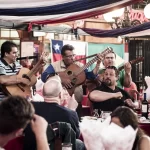
The director of Denominación de Origen talks to us about the film that won over national and international audiences by putting the belonging of a traditional food such as longaniza at the center of the debate, reaffirming the value of Chilean territorial cinema as a tool to make local identities visible.
It also reflects on the value of rescuing local identities and projecting them to the world from an authentic perspective and with a sense of territory.
How have you perceived the Chilean public's reaction to "Denominación de Origen"? What do you think is the reason for this phenomenon?
The Chilean public has reacted in a tremendously positive way. We never expected it. It has been a very warm reaction, with a lot of affection and also a lot of euphoria, which gives me the feeling that something like this was needed, that it came to refresh Chilean cinema, it connected very well with our community, with our people.
I think there are several elements that explain its success. It has a very close audiovisual language, a playful and realistic way of showing reality, based on error and imperfection. Another thing is that the cast is made up of real people; there are no great talents or well-known actors, but people that one could meet in the street. The humor connects, because as Chileans we are cheerful and we always need a bit of that.
Finally, the theme and the story revolve around a very transversal food, the longaniza, which has been on all our tables.
How important is it for you to tell stories deeply linked to specific territories such as San Carlos?
Telling stories from the territory is very relevant, because it makes it possible to make visible beauties and goodness that are often not within reach. The film shows, disseminates and makes visible how neighbors organize themselves in marginalized territories.
This is a reality that still exists in deep Chile. Raising these voices is important, because we always see the riches of the regional capitals, but there are many riches in the shadows, which are equally or more valuable.
On the other hand, it exhibits the denomination of origin of the chupalleros of Ninhue, a traditional craft and Los Ángeles Negros, a band that was a sensation in the 70s. It also shows the southernmost rice in the world and, finally, you can discover the place of origin of our great folklorist, Violeta Parra.
What was the biggest challenge and reward of working with local natural actors? How did that influence the authenticity of the story?
The biggest challenge is not having much control over what is going to happen and that the actors could resist the filming process, which is very exhausting: 11 hours a day shooting, repeating for three weeks. I was a little afraid that they wouldn't resist and wouldn't enjoy the process.
Once we started to move forward, I discovered that it was also a richness not knowing the adventure at all. The actors had no access to the script, they only knew the narrative points and improvised, which allowed them to co-create scenes that I would never have imagined alone. This brought a unique authenticity to the story.
You have chosen the format of a documentary that mixes fiction and reality. What motivated you to use this approach?
The language chosen in this film was basically to find a system that would accommodate us and give us a little more freedom. My first film, "La mentirita blanca", left me a little bit exhausted. So, after that, I grabbed my mom's tape camera and started filming and interviewing people in my town, I began to take inserts and there I found a freedom, a game.
From Chile to the world
Denominación de Origen has been recognized internationally, do you think this kind of stories can bring global audiences closer to Chilean idiosyncrasy?
Anyway, it is nice to see how two things are mixed: a very particular story, but at the same time, some inverse effect happens that also makes them very global.
For example, it happened to us in Argentina, at the Buenos Aires International Independent Film Festival, where we won the award for Best Director. There, the Argentines approached us and said: "hey, this is us too. We are discussing here next door (with Uruguay) where is the dulce de leche, the alfajor, etc.".
Besides, I was inspired by this film because I had the chance to live in France, where they are fighters for their identity and protect it. At one point, the European Union wanted to impose pasteurization on all their cheeses and the movement was such that they said: "it will not be pasteurized because our cheese is like this, these are our rules", and they succeeded.
The film also shows the Chile Brand. Why do you think it is important to make the origin of Chilean products known and what impact can this have on the different territories and their identity?
I believe that the appellation of origin as such is a symbol, a process of union. Obtaining an appellation of origin requires several steps and, above all, paying attention and value to our wealth and goodness. So I think it is also super nice to preserve, to give the value that a lot of wonderful things that we have in our territory really deserve.
So I believe that the seal of origin helps us to value and also to ensure that, when they have the possibility of exporting, they have a seal of quality, of origin, of heritage to back them up, and, hopefully, that this itself will help to boost their sales and promotion in the world.
Finally, looking to the future, what lessons can be learned from this experience for future productions that want to promote local diversity or contribute to a country image through film?
I think the invitation and the learning is to get out of our desk. Sometimes we believe that they are super ideas, but, in some cases, the stories are already there, they already exist. For that we have to go out more to the territories, to know our Chile, to get into the depths. I would like to have more time to get to know the country, the saltpeter mines, Patagonia, Chiloé, etc.
The other reflection I have is that you have to be very honest and connect with what you really want, be transparent and not fall into this game that sometimes invades Chilean society, which is to be aspirational and try to be others.






